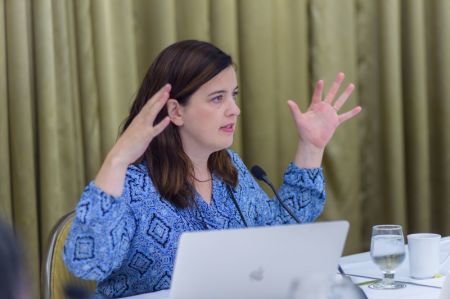Prosperity Gospel Scholar Says Belief That Pain Will Always Bring Reward Is a 'Beautiful Lie'

A divinity School professor known for her scholarship on the prosperity gospel is explaining why the notion that "everything happens for a reason" and other Christian-sounding phrases prove futile.
In an interview with Brian Lamb on C-SPAN's Q&A in February, Kate Bowler, a professor at Duke Divinity School in Durham, North Carolina, discussed her new memoir Everything Happens for a Reason: And Other Lies I Loved, said the book's title came from "boomerang theology" that people tossed around in an attempt to comfort her when she was diagnosed with cancer.
Two years ago, at age 35, Bowler was diagnosed with stage-4 colon cancer, an "incurable" kind which eventually spread to her liver. She wrote the book as a sort of "theological excavation project," she said, wherein she explored the possibility that perhaps the often tossed around phrase that "everything happens for a reason" and other Christian-sounding clichés were lies she believed all along.
Bowler is also the author of the 2013 book, Blessed: A History of the American Prosperity Gospel.
During the hourlong interview, Lamb asked Bowler about the words and practices of infamous prosperity preachers like Mike Murdock and Benny Hinn, as well as other popular ministers like T.D. Jakes and Rick Warren. Footage was also shown of Hinn praying for a woman who was suffering with cancer. He prayed in such a way that led viewers to think she was totally healed afterward.
"When I see something like that I can only see it from her perspective," Bowler commented.
"I've had a lot of people pray for me similarly and as a Christian I believe that Christianity has a very long tradition of divine healing. So I certainly don't think that it's not possible for God to heal people. But you can see how quickly he moved from praying for her, he as the anointed vessel of God, and then his confidence in himself as that vehicle, and then the idea because she did not have pain in that moment she's definitely healed."
Lamb then showed a clip of Warren speaking about how God uses pain to get our attention and uses pain to prepare people for a "breakthrough."
"So if you're in pain right now, congratulations," Warren is shown saying.
Bowler was asked if she believed that.
"What he is getting at is the theology that most Americans want to share, which is that somehow that pain is always progress," she said, pointing out that Warren is not a prosperity preacher but a Southern Baptist style of an evangelical.
"I don't believe that anymore," she continued. "I think I really thought that life was just sort of a series of ladders and if I just kept trying and climbing that it was always going to lead to something," she said, particularly as one who experienced "pain that just leveled me."
She added, "Part of it was just me not being able to cure my own cancer and assume that I will always have the time I want with my family and be able to imagine the future for myself that I expected."
Bowler went on to say that while beautiful things can happen in dark seasons, she believes that "it is a beautiful lie to say that pain will always be a reward."
When asked if being diagnosed with cancer at a young age had led her to change her mind about anything related to faith, she replied:
"Yeah, I think I have. I've always considered myself a pretty Jesus-y type but I think so much of it was wrapped up in me assuming that God was a part of this life enhancement project I was on called life. And the second I got very sick, and you kind of come to the end of yourself, I will admit it was a really spiritual, is a really spiritual powerful time for me," she said, stuttering slightly, noting her ease speaking about the faith experiences of others but her discomfort describing her own.
"I felt the presence of God. I felt the love of other people. The second I got sick my whole little community got together in a chapel and prayed like marathon runners for me, handing off throughout my whole surgery."
The Duke professor says she's living "scan to scan," with the cancer now more manageable.




















